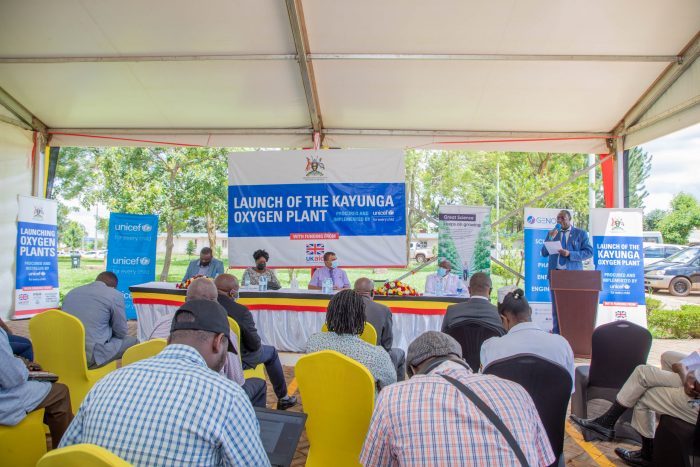UK Government supports procurement and installation of Oxygen Plant in Kayunga Regional Referral Hospital.
The UK Government – through UNICEF – has procured a Pressure Swing Adsorption Oxygen Plant in Kayunga Regional Referral Hospital, to increase the oxygen-producing capacity of the 200-bed facility and other lower-level facilities in seven neighboring districts in central Uganda. The Oxygen plant installed by UNICEF in February 2022 was today unveiled and officially launched by the Ministry of Health.
Globally and in Uganda, the demand for oxygen sharply increased during the COVID-19 pandemic, far exceeding the capacity of oxygen generated in many referral hospitals. The scarcity led to the loss of lives of critically ill patients who depended on oxygen therapy daily to stay alive.
Moreover, oxygen remained a critical treatment for small and sick new-born, children with severe pneumonia and other life-threatening respiratory diseases common among children under five years, and mothers with delivery complications.
Since the onset of the pandemic, the Ministry of Health with support from UNICEF has been working tirelessly to expand access to life-saving oxygen. To date, UNICEF has supported a total of three oxygen plants that have been procured and installed in Soroti, Kabale, and Masaka regional referral hospitals.
The additional oxygen plant in Kayunga RRH will therefore sustain the hospital oxygen needs as well as cater to those of other health facilities in seven neighboring districts of Buikwe, Jinja, Kayunga, Kamuli, Luwero, Mukono, and Nakasongola through the production of up to 140 cylinders daily.
The Foreign, Commonwealth, and Development Office (FCDO) Director for British High Commission Kampala, Mr. Andrew Ockenden, said “During the peak of the second wave of COVID-19 Uganda experienced an acute shortage of Oxygen. Thanks to the strong partnership between the UK and UNICEF I am pleased that we were able to quickly address this challenge, helping to supply oxygen to 17 hospitals across Uganda and procuring a number of oxygen plants. The plant being commissioned today is just one example of the UK’s ongoing commitment to supporting and strengthening health systems across Uganda, helping to save lives and guarantee Uganda’s health security.”
Along with the plant, the UK Government has also supported the procurement of oxygen delivery equipment that includes 100 Oxygen cylinders, 40 oxygen concentrators, over 15,000 face masks, and oxygen masks for adults and children for distribution to Soroti, Kayunga, Kabale, and Masaka Regional Referral Hospitals. An additional seven health facilities benefitted from oxygen cylinder refills and Personal Protective Equipment (PPE) including surgical masks, aprons, hand sanitizers, and liquid soap to support Infection Prevention and Control efforts, thereby guaranteeing the safe delivery of health care during the pandemic and beyond.
The UNICEF Representative in Uganda, Dr. Munir Safieldin said “During the COVID-19 pandemic, the immediate availability of medical oxygen became the defining line between life and death in the Intensive Care Units (ICUs). UNICEF and FCDO joined hands to save the lives of COVID-19 patients in ICUs by supplying medical oxygen. The good news is that the oxygen plants and oxygen cylinders we supplied were also critical to saving the lives of thousands of small and sick babies with breathing difficulties throughout the year.”
“UNICEF remains grateful to the UK Government for this timely support that will supplement other high impact interventions aimed at saving the lives of children and women in Uganda, as the nation continues to recover from the COVID-19 pandemic. Now is the time to build back better,” he added.
To fully optimize the use of the new oxygen plant, with support from the UK Government, UNICEF is currently installing an oxygen piping system to support the distribution and continuous flow of oxygen to critical areas like the pediatric, neonatal, maternity, post-natal, and medical wards as well as the operating theatre within Kayunga Regional Referral Hospital.














